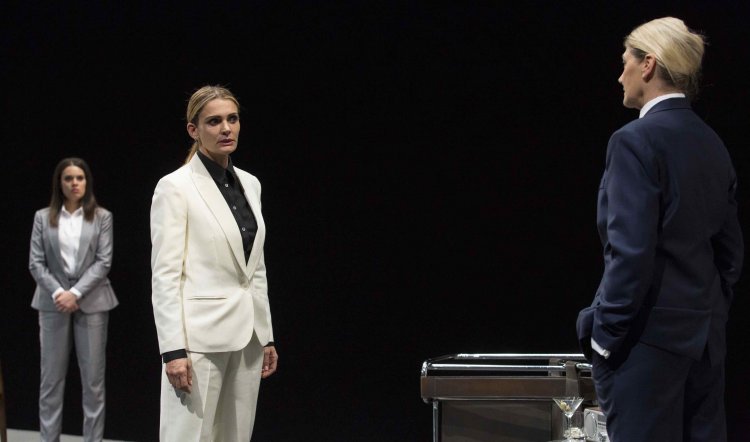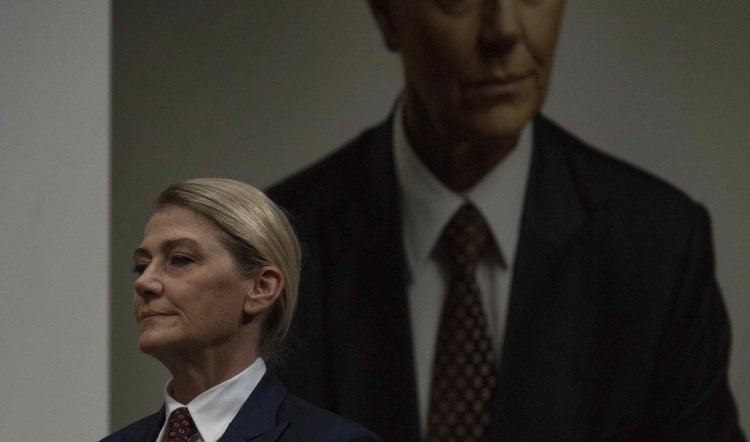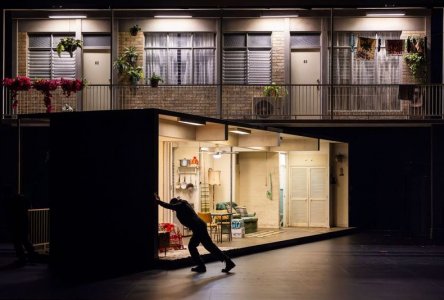
BOYS WILL BE BOYS
BOYS WILL BE BOYS, Sydney Theatre Company at Wharf 1, 18 April-16 May 2015. Photography by Brett Boardman - above: Sophia Roberts, Danielle Cormack and Tina Bursill; right: Tina Bursill.
Such an innocuous title. A cliched phrase most often affectionately spoken with a benevolent smile, sheepish head shake and rueful indulgence – of a window broken by a cricket ball, of a football retrieved for the umpteenth time from next door’s backyard, of scraped knees and “best” clothes ruined. Of a drunken night on the town that results in a young woman raped and traumatised. “Boys will be boys,” they say – we say – let’s not let ourselves off the hook that easily.
And nowadays – the era of the selfie and a camera in every hand – boys will be boys and they make home movies of their adventures. It’s one such incident that lies at the heart of a new play by Melissa Bubnic. But before arriving at this climactic event, the boys are first revealed, albeit obliquely, in all their entitled vainglory.
Astrid Wentworth (Danielle Cormack) is a brutally successful forex trader whose sharp designer suit and stratospheric black stilettos are her symbolic female weapons of war. Desperate to join her on the battlefield is Priya (Sophia Roberts), although her neat skirt and blouse and sensible loafers suggest she’s not fully cognisant of what lies ahead in this war to end all wars.
But before Priya gets her wish, however, the play opens up and dissects the world of currency trading through close attention to Astrid and her daily – and nightly – routine. Hustling for clients, hustling with clients and just plain hustling is her way of life and only when she slides, exhausted, onto a late night bar stool does lonely reality get anywhere near impinging on her consciousness.
Also sitting at the bar is Isabelle (Meredith Penman) and the relationship between them is both funny and razor-edged in its honesty and pitiless view of women’s role in society. She is a prostitute (no mucking about with the euphemistic “sex worker” tag) and knows more about hustling and the way to a man’s wallet than Astrid’s had dry martinis.
The exchange between Astrid and Isabelle is astringent and clear-eyed in its dissection of male-female transactions, economic and otherwise. Isabelle’s understanding of her job is astute and unsentimental and Astrid is fatally attracted to that strength: moth to the flame, rabbit in the headlights. Bubnic has a deft ear for the patois of both occupations and for tartly amusing one-liners. It is employed to great effect as the two women explore each other’s place in society as working women, and the power they have – or do not have – in their daily transactions.
Power is the over-arching topic under discussion throughout, however and, according to the play program, was sparked off by the concept of “erotic capital” – that which women have and need to spend in order to get on in a man’s world. It’s a neat bit of pop culture-speak and comes from Honey Money: the Power of Erotic Capital, a book by London School of Economics academic Dr Catherine Hakim. (Although Rattray and Bubnic seem to think journalist Laurie Penny coined the phrase rather than giving the book a scathing review in the New Statesman.) Even so, it doesn’t really bear close inspection and the play is better off standing on its own job lot of towering black patent stilettos – worn by each character, regardless of gender or position in the scheme of things.
It’s power that surrounds Arthur (Tina Bursill) and his superficially benign demeanour is even more chilling for its serenity. In the ’90s on Wall Street he would have been known as a BSD – big swinging dick, remember? – and he is Astrid’s boss of bosses and a man who occupies what Astrid can only talk about: the real difference between the boys’ world and the girls’ world. Arthur doesn’t give a shit about the glass ceiling: he’s seen it used too often to cut lines of coke to think it has any other purpose.
Having Arthur portrayed by the elegant, funny and beautiful Bursill is a master stroke in the casting of women to play all roles – male and female. Opposite Arthur in time and status is the drippy Harrison (Zindzi Okenyo) a junior player whose father is Arthur’s long time friend and client. He is emblematic of what is, for women in any workplace, a deadly combination of male privilege and inherited advantage. That Okenyo also doubles as a tassel-tossing, pelvic-thrusting lap-dancer in a burlesque club is a mordant and effective scene, although too long (some paring back of indulgent moments would be in order).
And it’s made tangibly uncomfortable when the lap on which she bumps and grinds is that of Priya: at Astrid’s insistence the young turk is desperately trying, on an evening out with clients, to be one of the lads, with an ultimately disastrous outcome.

Although entertaining, thoughtful and accomplished, Boys will be boys does give the impression of being a work in progress or transition. It is odd, for instance, that much is made of Priya being of Bangladeshi descent – through Astrid’s warnings that she will encounter racism and be the butt of jokes on the trading floor – and Arthur thinking she is Indian and doesn’t care that there is a difference. Yet when the drunken night out ends in rape and on mobile phones there are peculiar unacknowledged echoes of the sub-continent’s violent rape culture, highlighted by the ghastly gang rape and murder of Jyoti Singh Pandey in 2012.
So why make Priya an “Indian” if there is no further use for her ethnicity beyond trite jokes? Was there originally an idea to explore traditions of female submission and obedience in Indian/Bangladeshi/Pakistani society and whether it still holds women when transported to Australia? (Some 600,000 Australians are of those three ancestral ethnicities.) Who knows, but otherwise, what is the point?
Canadian playwright Yaël Farber has written a docudrama around India’s rape culture. Nirbhaya opens in New York this week after success at the Edinburgh Fringe. The title means “fearless one” in Hindi and is what the Indian media named the then anonymous victim. It was through the crime and now this play that the attitudes of men in India were exposed by the savagery and heedlessness of the attack on the young woman (travelling home from the movies with her boyfriend) and what she provoked in them: disdain, hatred and fear.
Ironically, in Boys will be boys there is a strong sense of that same disdain and hatred but it’s in the way Astrid is jolted into describing Isabelle when she asks her, with a sneer, “How do you demean a whore?” It’s a more shocking moment than when she later advises Priya, post-assault, to suck it up and not be a girl if she wants to work and succeed in their business.
Double irony in Yaël Farber’s observation then: “When you stay silent, that silence protects only one entity, and that’s the perpetrator. The cost on the self is exorbitant, because that silence is corrosive.” (Huffington Post.) And in the end it’s Astrid’s self that is corroded and damaged, possibly beyond repair.
Topped and tailed and interspersed with vignettes of Astrid playing at a bit of late night autobiographical cabaret, Boys will be boys is rarely less than fascinating and always entertaining. By the time she gets to a dark night of the soul and Chicken Shack’s I’d Rather Go Blind, Astrid has made the journey from successful brute to brutal failure. How each member of the audience responds will depend on how much we are willing to be accountable for the society we live in.
Played out in a sleek, white space that becomes office, conference room and even – via the table top and a giant mirror ball – the burlesque club (design David Fleischer, lighting Ross Graham) the play is all about the characters and the forces that drive them. That some could do with more focus and clarity is perhaps the nature of such a wildly ambitious play – one that bursts with ideas and themes.
When it comes down to it: thank god for ambition and a refusal of the ordinary. The actors are all splendid, the humour and drama are sharp and often shocking and there is much to think about afterwards. It’s sold out already and returns and Suncorp Twenties are the only way to go. It would be worth making the effort.



